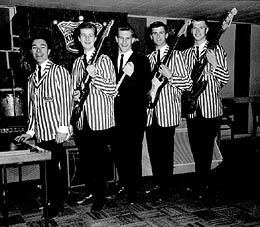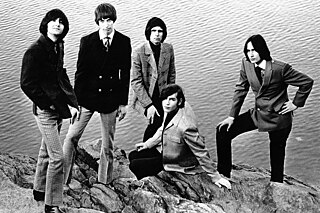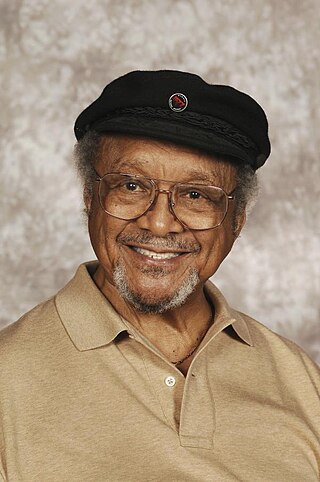
The Surfaris are an American surf music band formed in Glendora, California, in 1962. They are best known for two songs that hit the charts in the Los Angeles area, and nationally by May 1963: "Surfer Joe" and "Wipe Out", which were the A-side and B-side of the same 45 rpm single.

The Kingsmen are a 1960s American rock band from Portland, Oregon. They are best known for their 1963 recording of R&B singer Richard Berry's "Louie Louie", which held the No. 2 spot on the Billboard charts for six weeks and has become an enduring classic.

Paul Revere & the Raiders were an American rock band formed in Boise, Idaho, in 1958. They saw considerable U.S. mainstream success in the second half of the 1960s and early 1970s. The band was known for including Revolutionary War-style clothes in their attire.

The Left Banke was an American baroque pop band, formed in New York City in 1965. They are best remembered for their two U.S. hit singles, "Walk Away Renée" and "Pretty Ballerina". The band often used what the music press referred to as "baroque" string arrangements, which led to their music being variously termed as "Bach-rock", "baroque rock" or "baroque pop". The band's vocal harmonies borrowed from contemporaries such as the Beatles, the Zombies and other British Invasion groups.
Jokers Wild were a British rock band formed in Cambridge, England, in 1964. The group were active until 1967, and are best known for launching the career of guitarist David Gilmour, who went on to join Pink Floyd.

Eugene Edward "Snooky" Young was an American jazz trumpeter. He was known for his mastery of the plunger mute, with which he was able to create a wide range of sounds.

Ross Andrew Wilson is an Australian singer-songwriter, musician and producer. He is the co-founder and frontman of the long-standing rock groups Daddy Cool and Mondo Rock, as well as a number of other former bands, in addition to performing solo. He has produced records for bands such as Skyhooks and Jo Jo Zep & the Falcons, as well as for those of his own bands. He appeared as a judge on celebrity singing TV series It Takes Two from 2005. Wilson was individually inducted into the Australian Recording Industry Association (ARIA) Hall of Fame in 1989 and again as a member of Daddy Cool in 2006. Ross currently resides in the Melbourne suburb of Port Melbourne.

"Eagle Rock" is the debut single by Australian rock band Daddy Cool, released in 1971 on the Sparmac record label. It went on to become the best-selling Australian single of the year, achieving gold status in eleven weeks, and remaining at No. 1 on the national charts for a (then) record ten weeks. "Eagle Rock" also spent 17 weeks at the No. 1 spot on the Melbourne Top 40 Singles Chart. The song was re-released by Wizard Records in 1982, and reached No. 17 on the Australian singles chart.

Richard Franklin was an Australian film director.

Procession were an Australian psychedelic band formed in Melbourne in 1967. The band was composed of Australian Craig Collinge (drums), New Zealander Brian Peacock (bass), and Englishmen Trevor Griffin (organ) and Mick Rogers. They were described by Glenn A. Baker as one of the most ambitious bands in the Australian music scene in their time, although they enjoyed only moderate commercial success. They were regularly championed in Go-Set magazine and had their own segment on music TV show Uptight, of which their manager was the producer.

Ross Andrew Hannaford was an Australian musician, active in numerous local bands. He was often referred to by his nickname "Hanna". Widely regarded as one of the country's finest rock guitarists, he was best known for his long collaboration with singer-songwriter Ross Wilson, which began as teenagers, with The Pink Finks and forming the seminal early '70s Australian rock band Daddy Cool. Hannaford died of cancer after being diagnosed a year earlier.
Gary Young is an American-born Australian musician who was a founding member of Australian rock band Daddy Cool in which he played the drums and sang backing vocals. He also played drums with Jo Jo Zep & The Falcons amongst other bands. Young was twice inducted into the Aria Hall of Fame as a member of both Daddy Cool and Jo Jo Zep & The Falcons which were inducted into the Australian Recording Industry Association (ARIA) Hall of Fame in 2006 and 2007 respectively.
Daddy Cool is an Australian rock band formed in Melbourne, Victoria, in 1970 with the original line-up of Wayne Duncan, Ross Hannaford, Ross Wilson and Gary Young. Their debut single "Eagle Rock" was released in May 1971 and stayed at number 1 on the Australian singles chart for ten weeks. Their debut, July 1971's LP Daddy Who? Daddy Cool, also reached number 1 and became the first Australian album to sell more than 100,000 copies. The group's name came from the 1957 song "Daddy Cool" by US rock group The Rays. Daddy Cool included their version of this song on Daddy Who? Daddy Cool.
Sons of the Vegetal Mother were an Australian "esoteric special-occasion progressive band", formed in late 1969, with a floating line-up based around the nucleus of Ross Wilson and Ross Hannaford. A side-project of the band, formed in 1970 was Daddy Cool, which played 1950s doo-wop music plus some originals. Daddy Cool were to eclipse their parent band when their debut single "Eagle Rock" reached No. 1 on the Australian National charts.
Mighty Kong were an Australian 'supergroup' successor to Daddy Cool, which broke up in August 1972. It was also the fifth in the line of groups that featured singer-songwriter Ross Wilson and guitarist Ross Hannaford, which began with Pink Finks in 1965. Despite its all-star line-up, drawing from three of the top groups of the time, the band was short-lived and never really achieved its considerable potential, effectively relegated to being a footnote in the story of Daddy Cool.

Flamingo is the second studio album by the rock band the Flamin' Groovies. It was released in 1970. Following the group's departure from the Epic record label, it was the first of their two albums for Kama Sutra Records.

Live at the International, Las Vegas is a live album by Jerry Lee Lewis that was released on Mercury Records in 1970.

Primal Park is the debut studio album by Australian rock band Mondo Rock, released in October 1979 and peaked at number 40 on the Kent Music Report. The album is a mixture of live recordings and studio recordings. It spawned the non-charting singles "Searching for My Baby" and "Primal Park", both of which were studio recordings. In 2009, the album was remastered and included eight bonus tracks.

Swing is the fifteenth and final studio album by Australian soul and R&B singer Renée Geyer. The album was released on 19 April 2013 and peaked at number 22 on the ARIA Charts.
"Come Back Again" is an Australian rock song, released by Daddy Cool in September 1971 on the Sparmac record label. It reached number 3 in the Australian charts.













